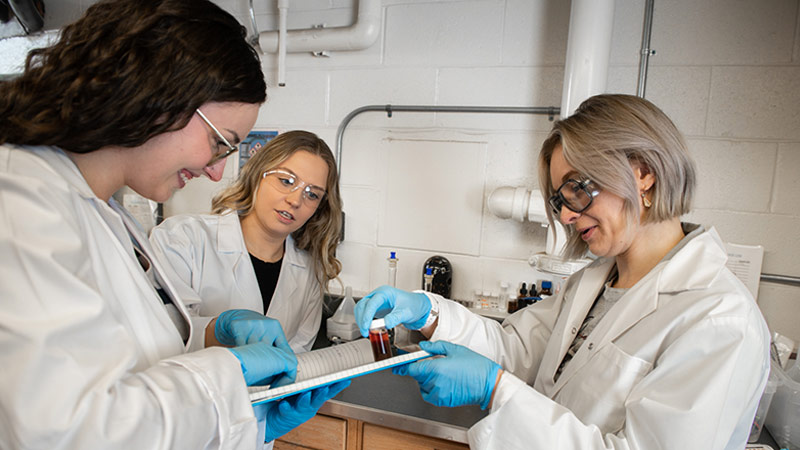UNB researcher awarded $300,000 specialized nuclear research grant
Author: Jeremy Elder-Jubelin
Posted on Jun 16, 2023
Category: UNB Saint John , UNB Fredericton

Dr. Olga Palazhchenko, a researcher at the University of New Brunswick’s (UNB) Centre for Nuclear Energy Research (CNER), has been awarded new funding to further develop the centre’s leading work in support of small modular reactor (SMR) design, safety and operation.
The Natural Sciences and Engineering Research Council of Canada (NSERC) and the Canadian Nuclear Safety Commission (CNSC) awarded Palazhchenko, an assistant professor of chemical engineering, more than $300,000 from the NSERC-CNSC Small Modular Reactors Research Grant program.
Palazhchenko’s three-year project will focus on ensuring human and environmental safety in the long-term storage of used fuel from small modular reactors (SMRs).
While SMRs are like other forms of nuclear power generation, they are advancing new technologies and materials, including a variety of proposed fuel types, sizes and compositions.
Some of these technologies have not yet been extensively used and Palazhchenko says they will require research to fully understand how they might react in a broad range of circumstances.
“The long-term solution for spent fuel storage for Canada’s traditional, CANDU-type reactors is storage underground in what is called a deep geological repository, or DGR,” she said. “Since SMRs are an emerging technology, we need to understand how their fuel could interact with the environment in a DGR, particularly in a worst-case scenario like a flooding event.”
Palazhchenko’s research will explore the impact of potential storage of fuel from new SMR technologies on the current DGR disposal concept, considering the chemical reactions that could take place if the storage site were exposed to water.
Some of these reactor designs will contain traces of sodium in the fuel. Since sodium is reactive with water and oxygen, understanding and predicting the potential effects of the resulting exothermic reaction is important. Determining these effects is a complex problem, as the amount of sodium, the extent of water entry through the storage container and fuel cladding, and the environmental scenarios are all variable factors.
This grant will enable Palazhchenko to grow her research team, engaging current and future highly qualified personnel. Ranging from undergraduate to PhD students, these researchers will receive hands-on training and experience in designing, operating and optimizing novel equipment and customizing analytical devices to investigate the reactions and corrosion effects that result from the interaction of the cladding alloys that enclose the fuel, fuel materials such as sodium or molten salts, and water.
Palazhchenko and her team will collaborate with Natural Resources Canada experts at the CanmetMATERIALS research centre in Hamilton, Ontario, which will provide access to their suite of advanced corrosion testing and characterization equipment.
“As well as being novel and interesting science in its own right, Dr. Palazhchenko’s project speaks to a number of our institution’s values and goals,” said Dr. David MaGee, UNB’s vice-president (research).
“It responds to Canada’s decarbonization and energy transition strategy; it seeks to create a safer future for our communities and our natural environment, and it will educate and inspire tomorrow’s experts. Congratulations to her, and to her team, for this success. I look forward to seeing the results and impact of her work.”
Palazhchenko’s research is also supported by a grant from the New Brunswick Innovation Foundation Research Professional Initiative (RPI) fund, a joint initiative with the New Brunswick Department of Post-Secondary Education, Training and Labour. The RPI provides applied researchers with funding to hire research professionals and will support a lab and project manager position on Palazhchenko’s team.
